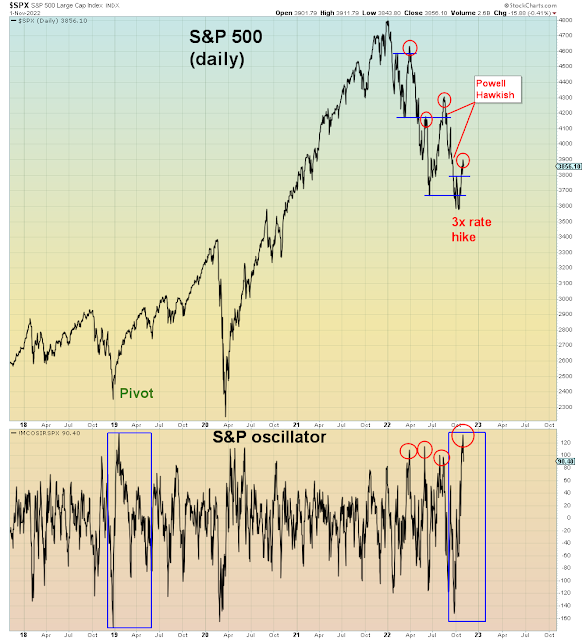Global central banks will tighten more in this fourth quarter than they've tightened in any fourth quarter in the past forty years. Nevertheless, gamblers see a headlight at the end of the tunnel...
At some point, we all know that an oversold bounce will morph into a long-term rally. That's how it happens at every important low. It begins with short-covering and then transitions to REAL buying. The only thing bulls and bears now disagree upon is when that will happen. Bulls are very eager to pull forward that event as soon as possible. In the process they are happily ignoring the various risks that have been growing steadily throughout 2022. Therefore it's now obligatory to believe that the Fed is the ONLY risk to markets. Once they're done tightening, everything will be tea and crumpets for "stocks". I assert that the Fed has already over-tightened but the "front-loading" of Volcker magnitude rate hikes has yet to make themselves known.
First off, the inflation trade is STILL on in full force. This means that late cycle Energy stocks are leading, growth stocks are imploding, and Treasury bonds are getting hammered. The stock/bond ratio has never been more overbought than it is now. One can make the case that stocks are MORE overvalued now than they were at the top a year ago. Why? Because of the dual effect of reduced earnings and higher interest rates. Wall Street has been very slow to bring down earnings forecasts, and companies have been even slower to guide down for 2023. So now next year sits there like a big black hole of earnings visibility.
Perfect for those who don't want to believe that recession is inevitable.
The rate of tightening combined with the rate of home price increase has left the housing market effectively bidless:
"Homebuilders say 2023 is going to bring an even sharper downturn in the market, as high interest rates scare away buyers"
“There’s this cliff that’s happening in January...”
Single-family housing starts fell a stunning 80% from January 2006 to March 2009, but Myers notes that it was a slower turn compared with what is happening now"
The bull case is that the Fed will soon stop rate hikes and hold them at this level until inflation comes down. Unfortunately only recession and asset crash will bring down inflation. And it will bring down record corporate profit at the same time.
Investors are no way positioned for recession even though they need one in order to effect their next bailout. The moronic irony can't be overlooked. A consequence of the Fed balance sheet-induced wealth effect being in lockstep with the CPI. So in the meantime - while inflation is NOT coming down - the real economy implodes.
But what does this have to do with end of year melt-up?
First off, this latest oversold bounce began two weeks ago, so it is nearing the point where it must transition to the next phase of real buying. Or else it will suffer the same fate as the last three failed "pivot" rallies. The Dow is record overbought and just had its best month since 1976. The S&P is the most overbought since the Fed's actual pivot in late 2018.
The critical difference vis-a-vis 2018, is that the Fed/ECB/BOE et al. STILL have many more rate hikes in store for these next two months. Whereas back in 2018 when the oscillator reached this level, the Fed had already pivoted and no other central bank was raising rates.
I don't know what Powell will do tomorrow. As we see above he's been hawkish for two months straight - each time pounding markets lower.
What we need to understand is that bulls have now decided that even a .75% rate hike this week followed by a .5% rate hike in December would be BULLISH. What would have been considered unthinkably bearish a year ago, is now the bull case for the end of the year. Fed futures have a 95% probability of AT LEAST 4.25% Fed rate by the end of the year:
So why bother being bearish when the bulls are just going to co-opt all of our concerns and conflate them as being bailout friendly?
Let's say Powell hints at a "step down" in rate hikes tomorrow. Sure markets could explode higher for a few hours or days. But ultimately this is still only a technical rally. So everyone must decide for themselves if they are a short-term trader or a long-term investor.
Because now the bull case and the bear case are essentially the same, the only difference is what happens AFTER the glue fumes wear off.
Position accordingly.






